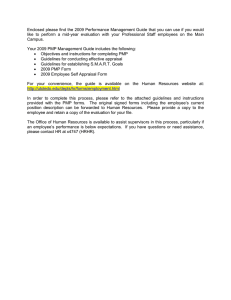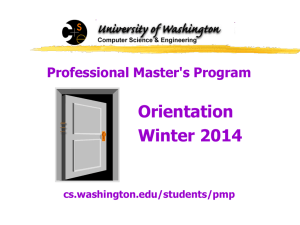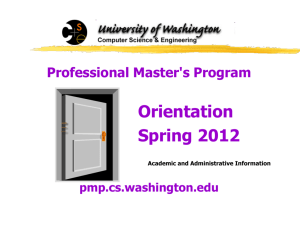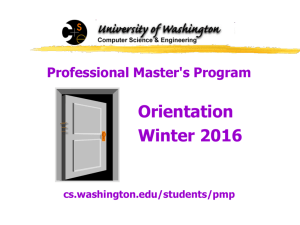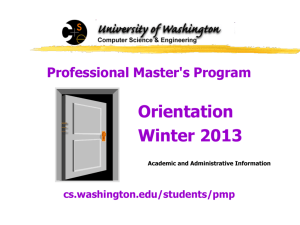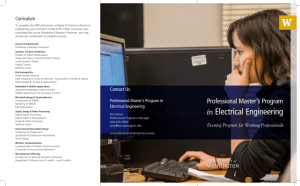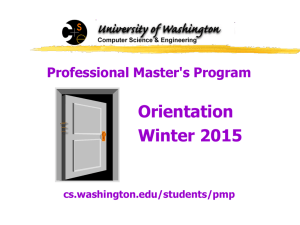Orientation Spring 2016 Professional Master's Program cs.washington.edu/students/pmp
advertisement
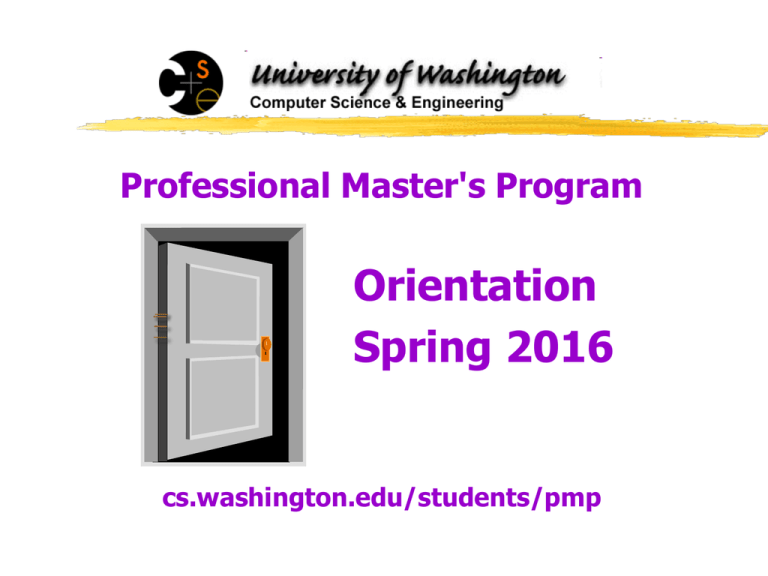
Professional Master's Program Orientation Spring 2016 cs.washington.edu/students/pmp Welcome from PMP Staff Dave Rispoli Advisor rispoli@ cs.washington.edu Pedro Domingos Faculty Coordinator pedro@cs.washington.edu Fred Videon Software Engineer fred@ cs.washington.edu prieto@cs.washington.edu Tonight’s Orientation 1. Food/Ice Breaker 4. 2. Welcome/ Dept./PMP Overview 3. CSE/UW Computing Facilities Academic Info Admin Info Departmental Excellence US News Graduate Program Rankings Computer Science (6) Computer Engineering (15) By Ranked Computer Science Areas Systems (5) Theory (9) AI (5) Programming Languages (13) Latest Accomplishments: http://www.cs.washington.edu/news_events/ Research Areas: http://www.cs.washington.edu/research/ CS&E Students Undergraduate programs 770 full-time students 240 degrees conferred per year Fifth Year Master Program 15 full-time students Started in 2008 for current CSE undergrad students Full-Time Graduate Program – research focus 225 full-time students 25 Ph.D. graduates per year Professional Master’s Program 160 part-time students 60 new students per year 50 graduates per year (729 to date) Mission Allow IT professionals access to CSE faculty & curriculum Students exposed to latest research developments Promote regional IT recruiting and advancement Strengthen existing CSE/Industry partnerships Not: Path to the Ph.D. program Not: Advanced technical training program Degree Requirements PMP leads to a MS Degree in Computer Science & Engineering Degree (non-thesis) consists of approximately 40 credits: Eight Professional Master’s Program courses (4 credits each) No pre-requisites exist among courses Eight additional credits Typically fulfilled by enrolling in our colloquium series (1 credit each) Time to complete the program: 2 1/2 years - one course and one colloquium per quarter. No classes offered in summer. Academic Progress Academic Progress Students must complete degree in timely manner (15 credits/year recommended) 6 years (including ALL time spent on-leave) is the maximum time allotted by the UW for earning a Master’s degree Continuous Enrollment Students enroll in at least 2 credits or be formally on-leave at all times during program (excluding Summer quarter) On-leave status must have Faculty Coordinator approval. Academic Progress (cont.) Scholarship A cumulative GPA of 3.0 or above required for master’s degree A grade of 2.7 or above required for a course to be counted toward degree. (8 courses of 2.7 or above required for degree.) Transfer of Credit You may petition for transfer of up to 6 credits of graduate level course work (completed as a graduate student only) that has not counted towards any other degree Contact advisor to expedite the approval process Other Important Policies Listed at: http://www.washington.edu/students/#ACADEMICS It is student’s responsibility to be familiar with UW policies Instruction Graduate courses especially designed for working professionals: Targeted class limit of 45 students Moderate length assignments Manageable group projects Final exams Accessible: Some PMP courses available on-line and at Microsoft Instructors: Regular faculty and other highly qualified instructors Almost all instructors have their own research programs University resources: World class library Generous computing facilities Courses Regular Courses: Operating Systems Distributed Systems Compiler Construction Programming Languages Software Engineering Network Systems Digital Systems Computer Architecture Parallel Computation Artificial Intelligence Data Mining/Machine Learning Applied Algorithms Computational Biology Software Systems Image Understanding/Comp Vision Computer Graphics Human Computer Interaction Transaction Processing Database Management Systems Software Entrepreneurship Computer Security Natural Language Processing Molecular & Neural Computation Robotics Ubiquitous Computing Some one-time courses: Alternative Computer Paradigms Mobile Computing Ubiquitous Computing IT in the Developing World Cryptography Concurrency Complexity Theory Quantum Computing Colloquia Enables students to see state of art research from the best in field. Note especially our Distinguished Lecturer Series. Info: cs.washington.edu/students/pmp/colloquia/earning_credit/ Students can view talks live or on-line. (90% available on-line) Live: Tues.& Thurs. 3:30-4:30 room EE-105. On-line: “on demand” link from URL above. To earn 1 credit: view any 8 colloquia; report on any 4. (From any day, week or year!) Colloquia reporting system: Search: http://norfolk.cs.washington.edu/htbin-post/unrestricted/colloq/search.cgi Reporting: http://norfolk.cs.washington.edu/htbin-php/colloq_reporting/summary.php Planning your program Regular courses are normally taught on a two-year cycle. Normal: 8 courses + 8 credits of colloquia Exceptions: Replace colloquia with regular PMP courses Daytime graduate courses (with permission) No research options. Contact PMP Advisor for questions. Graduation Degree application process described at: http://www.grad.washington.edu/stsv/mastapp.htm The two most important things to remember are: PMP students must register for at least two credits in the quarter they wish to graduate PMP students must apply for their degrees in the first month of the quarter they plan to graduate. Watch for CSE Events at your Company! Graduation Events!!! PMP Graduate Dinner CSE Graduation Event Husky Stadium Commencement Current Courses Spring 2016 cs.washington.edu/students/pmp/courses/current/ CSE P 531 Computability and Complexity Theory James Lee – Instructor; Day/Time: Wednesday 6:30-9:20 pm; Place: Johnson 175 A survey of the theory of computation including Turing Machines, Church's Thesis, computability, incompleteness, undecidability, complexity classes, problem reductions, Cook's theorem, NP-completeness, randomized computation, cryptography, parallel computation, and space complexity. CSE P 546 Machine Learning Pedro Domingos - Instructor (Distance); Day/Time: Tuesday 6:30-9:20 pm; Place: UW: Paul G. Allen Center for CS&E, room 305; MS: Building 99, Room 1915 Methods for identifying valid, novel, useful and understandable patterns in data. Topics include: induction of predictive models from data (classification regression, probability estimation); clustering; and association rules. CSEP 590 Computational Biology Larry Ruzzo – Instructor; Day/Time: Thursday 6:30-9:20 pm; Place: Johnson 075 Introduction to the use of computational methods for understanding biological systems at the molecular level. Problem areas such as mapping and sequencing, sequence analysis, structure prediction, phylogenic inference, motif discovery, expression analysis, regulatory analysis. CSEP 590 Domain-Specific Languages Rastislav Bodik – Instructor; Day/Time: Monday; Place: Johnson 111 The design principles of domain-specific languages. Implementation methods based on lightweight compilation and meta-programming support included in modern programming languages such as Lua, JavaScript and Scala. Case studies include DSLs for data visualization (d3), web client programming (jQuery, arrowroots, Rx), and big data frameworks (the Hadoop family). Note: When available (usually the week before courses start) Course Web pages are linked to the course titles on the current courses page! Registration PMP students register by phone [(206) 543-2310], fax, or mail using registration form Advisor sends quarterly to students' cs e-mail address. Registration and payment must be received no later than close of business Friday before quarter start. PMP students should be familiar with add/drop/withdraw policies at www.washington.edu/students/#ACADEMICS . Don’t worry about the Enrollment Deposit. myUW PMP students: Can’t use myUW to register for PMP courses Can use myUW http://www.myuw.washington.edu/ for: Billing Information Change of Address Schedule Information Student ID Cards For detailed information see UW Student ID Center Web site at www.washington.edu/students/reg/id.html Student ID Center, ground floor of Odegaard Library next to the By George Cafe, weekdays 8 to 5. Student ID Cards are also used for lab access. On first use be prepared to wait a few minutes for activation. UPASS information is available from links at Student ID Card Web Page referenced above. All PMP students must pay $76 for a UPASS whether they use them or not. Tuition Quarterly cost $4,625 ($925 per credit) One price for all! + $150 quarterly fees & textbooks Parking $2 per night campus parking permit available from UW Parking Services (otherwise $5 at gatehouse) http://www.washington.edu/commuterservices/parking/fees_description s/night.php The Parking Services Office at 3901 University Way NE is open M-F 7:30 to 5:00 and until 6:00 pm Mon-Thur. for the first week of classes. There are long lines during the first week of classes. Bicycle room available in CSE basement. Ask Dave for access. Carpool, bike and bus are very much encouraged! Microsoft mailing list for PMP students is uwpmp (managed through the usual MS portal) Food/Drink on Campus Getting the Word Out PMP students and graduates are the best way we have to spread the word on the Professional Master's Program. Please make sure talk to your friends and co-workers about your courses and the program. We would love to have more students just like you.
